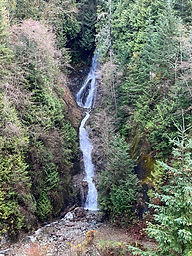Long Line Liberation
- kc dyer

- May 24, 2024
- 2 min read
SAR teams combine for successful Mount Hanover rescue effort

A well-organized group hike up Mount Hanover went suddenly wrong on Wednesday, proving that even with the best-laid plans, backup is sometimes needed.
In this case, backup came in the form of teamwork with North Shore Rescue (NSR), Lions Bay Search and Rescue (LBSAR), and a big yellow helicopter with a long line.
LBSAR manager Ed Langford takes up the story:
"A party of four hikers plus a 75-pound Husky left Lions Bay at 8 a.m. The group was well-equipped with snow shoes, crampons, ice axes and (in what appears to be a first) emergency spot beacons for each party member."
The group was successful in summiting Mount Hanover, which is reached via the Mount Brunswick trail and then traversing north through the Hat pass.
However during the descent, a 27-year old female hiker slipped in the steep snow gully, and slid about 15 metres through a rocky zone before coming to rest in a softer snow area. "The result was a deep knee laceration," says Langford.
The rest of the group managed to treat the injured hiker, but realized getting down would be a problem. They called 911 shortly after 3 p.m., LBSAR was dispatched, and the team swung into action.
As the situation was complex, and the hour getting late, LBSAR teamed up with NSR to perform a long line rescue.

Langford says that a joint member of LBSAR and NSR who is an ER physician attended the scene to deal with medical issues. The wounded hiker was successfully long lined out to a waiting ambulance and then on to hospital. The rest of the hiking party, along with the dog, were relocated on the mountain and then flown back to the Village with a LBSAR member.
"The spring hiking season has had a slow start for call-outs, yet we are in the transition time where it is sunny and warm in town but winter still lingers higher up on the mountain," says Langford. "It's fairly common for hikers to find themselves in steep, snow covered terrain without appropriate footwear. Losing their footing can result in a long uncontrolled slide into rocks or trees with potentially devastating consequences."
Langford notes that even with preparation and top-of-the-line equipment, this group faced misfortune. However, "they made the correct decision to call early for rescue."
He says that backcountry groups should remember to:
File a trip plan
Have a cell phone and back-up battery
Know where they are going and the expected conditions
And finally, if you are ever in need of back-country rescue, be prepared to call 911 and provide group and situation details.

The Watershed welcomes your thoughts. Leave your comments below, or email us at editor@lionsbaywatershed.ca
Like what you're reading? For as little as $5/month, you can support local independent journalism by subscribing to The Watershed HERE.








Comments